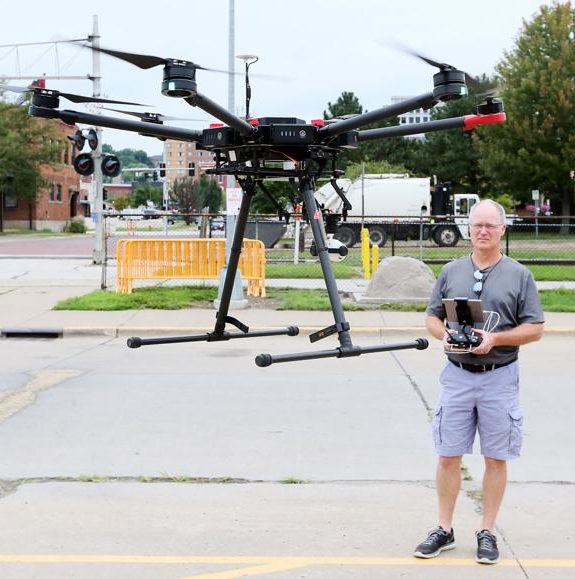A longtime Quad Cities journalist says news gathering technology has changed incredibly over the years, but good reporting, writing, and photography are still the most important elements of journalism.

Andy McKay began his 35-year career at WQAD as a photographer, later becoming chief photographer, and is now assistant news director at the station.
Cliff Brockman, a retired broadcast journalist and journalism professor, and Paul Yeager of Iowa PBS interviewed McKay for the Archives of Iowa Broadcasting Oral History Project.
Here are excerpts from McKay’s interview which have been edited for length and clarity. (Audio of the full interview is posted below.)
TV news is transient, people will stay maybe two years in the market, and then move on to the next bigger market. Or they get out and get into public relations. Why have you stayed for 35 years at WQAD? I was doing a story in the emergency room. There was some overnight stuff and I’d leave my equipment there. I met my future wife, through that story. (She was an ER nurse.) And I like the Quad Cities. I like the kind of stories we get to do. We’re not overrun with crime and breaking news all the time. So, it’s not that constant turnaround, we get to meet people and do people’s stories.
What do you dislike about working in the news business? Sometimes you show up places, and the only reason you’re there, and the only time you show up, is because something bad happened. You see a lot of sad things that happen. You have to focus on your job and doing what you’re assigned to do. And you kind of try to block some of that stuff out.
What are a couple of the biggest stories you’ve covered? The biggest story was the Dusty Hill story, a local soldier that was injured over in the Middle East. He was in a tank (blown up by an IED) and he was severely injured, I don’t know how he survived. We went down to Texas to visit him where he was recovering. We did like a five-part series, then we ended up doing an hour special. And that story consumed my mind, every waking minute. I’d wake up and I’d be thinking about it.
Another big story had to be the 1993 flood. It flooded downtown Davenport and several housing areas. That broke the 1965 flood record. And in a lot of ways, it wasn’t that exciting. It was a big event because it drew national attention, all the networks came in. But watching the river rise was like watching water boil, just slowly inching up. But it was like hand-to-hand combat with sandbags, and everybody was on their own. It went on all summer. It felt like we didn’t have a summer because it just rained and rained all the time. It wasn’t from snow melt or anything like that. It was just all rain.
Listen to the full interview with Andy McKay
Let’s turn to technology. When I first started, we were still using film. Then by the time you started we were using ¾ inch tape with a heavy camera and side recorder, along with a heavy tripod. How has that changed? Yes, those cameras and decks were heavy. Now we’re digital and we’re using SD cards. The cards can hold more and better video than a big 3/4 inch tape.
Also, communications. When I started, we had two-way radios in the cars. Then we had pagers, so you’d get paged, but then you had to go find a payphone to call and always had to have a quarter in your pocket. Then pagers went away because we got cell phones and there’s texting, there’s no more two ways.
The live element used to be satellite trucks and live trucks. Now it’s the little backpack and you can just go live so much easier. All our crews have GoPros. And we have drones too. We’ve never been better equipped to be out in the field covering news.
What about the editing? It used to be the large tape decks that weren’t mobile, and you had to be in the station to edit. It was a slow process. Now everything’s nonlinear. And you can edit on laptops. We can go anywhere, and we can feed from anywhere.
On a little lighter note, can you think of any anecdotes, anything that’s happened to you? Something people wouldn’t have seen on the air? These weren’t funny at the time, but they’re funny now. Nicholas Sheley was a serial killer and Chris Minor and I went to Galesburg to cover a visit by his parents in court. We went to Galesburg, and as soon as I parked the car outside the courthouse, I turned off the key. I realized I did not pack my camera. No camera. Galesburg is 45 minutes from our station. Chris had a new phone and I figured out Chris’s phone and shot the video on her phone.
Another one was when I first started in Montana, and I was covering Senator Max Baucus. I was covering a delegation from Japan visiting some Montana ranches. We went one place and we’re shooting and then we’re going to pack up and go to another location. I accidentally locked my keys in the car. Senator Baucus was able to break into my car and at the time that was, you know, embarrassing.
What do you enjoy the most about your job? Working with new reporters. We have some really good reporters who want to learn and do better. When you see them “get it,” and they start putting things into practice, and they start developing those skills and have good storytelling skills, that’s a good thing. And I enjoy that, enjoy that a lot.
What’s the future hold for you personally? I hope to retire on my terms. But I still have some work to do. I still need to work a few years yet.